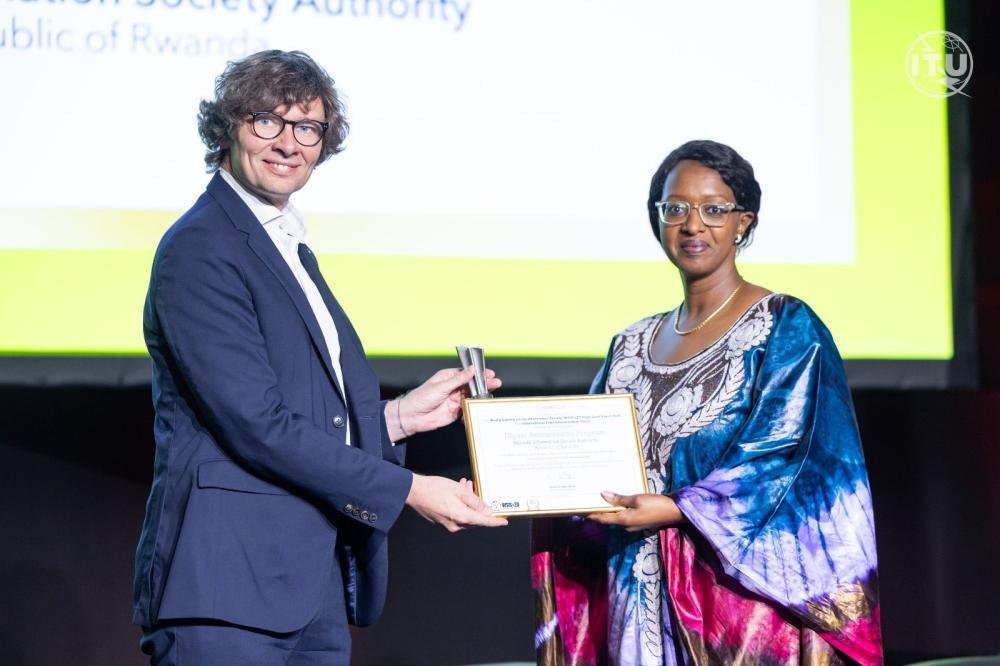Africa-Press – Rwanda. Rwanda’s push to expand digital literacy at the grassroots earned international recognition this week, with the country’s Digital Ambassadors Program (DAP), implemented by the Rwanda Information Society Authority (RISA), named one of the Champion Projects at the World Summit on the Information Society (WSIS).
The programme, which relies on ICT-savvy youth as apprentices to train citizens on how to use digital devices, was recognized on Monday, July 7, in Geneva, Switzerland, during an event that marked the 20th Anniversary of WSIS since its inception. Rwanda’s Ambassador to Switzerland, Urujeni Bakuramutsa, received the award on behalf of the government.
The Digital Ambassadors Program, implemented by Rwanda Information Society Authority, was recognised at the World Summit on the Information Society (WSIS) in Geneva, on July 7.
Millions of Rwandans have been impacted by the programme, according to official statistics.
In this article, The New Times highlights five key facts about the project.
1. Eight years of operation
The Digital Ambassadors Program was launched in September 2017, in line with the government’s digital transformation agenda under the first National Strategy for Transformation (NST1). The programme’s goal was to boost the number of digitally literate citizens, focusing on transforming rural communities and promoting the use of e-government services.
Through the programme, citizens are trained to use smart devices, navigate e-government platforms, access financial services, do business online, and practice digital safety. According to RISA, these skills have helped improve livelihoods through increased use of digital tools, better access to services, and greater digital inclusion.
DAP has helped form digitally literate and skilled populations by supporting job creation and increasing access to information, internet services, ICT infrastructure, and applications that support online services, officials say.
2. Contributed to a 45% rise in digital literacy
At the time of its launch, less than 10 per cent of Rwandans had basic digital literacy. With a target of reaching 60 per cent by 2024, DAP has trained 3,262,869 citizens between 2017 and 2024. As a result, the national digital literacy rate rose to more than 75 per cent by October 2024, according to the National Institute of Statistics of Rwanda (NISR).
“This recognition by WSIS+20 underscores Rwanda’s commitment to inclusive digital transformation and highlights the DAP model as a replicable approach for other nations seeking to bridge the digital divide. It celebrates our journey towards a digitally empowered society,” RISA said after the announcement of the award. “The Digital Ambassador Program is a transformative model that equips citizens with the necessary skills to engage with digital tools and services.”
3. Employment for secondary school and university graduates
The programme recruits ICT-skilled youth from secondary school graduates or university alumni as digital ambassadors. Starting with just 50 ambassadors during its pilot phase, it has since expanded to more than 2,000 active ambassadors and 60 district-level supervisors, with support from various development partners.
DAP provides youth with opportunities to upskill, gain experience, and contribute to community development, RISA said. It recruits young graduates as apprentices and places them at the local level. A digital ambassador coordination team oversees the program centrally, while district-level supervisors support implementation on the ground.
4. One of five projects submitted by Rwanda
Rwanda, through RISA, submitted five projects for the WSIS Prizes: the GIGA Project, the African Girls Can CODE Initiative (AGCCI), Digital Ambassadors Program (DAP), Hanga Hubs, and the Connect Rwanda flagship initiative. The Digital Ambassadors Program was recognized as a WSIS Champion Project.
Globally, 90 outstanding projects were selected as WSIS Prizes 2025 Champions from hundreds of entries, representing initiatives that are advancing digital transformation and inclusive growth across different sectors and countries.
5. Target of universal digital literacy
In line with the second National Strategy for Transformation (NST2), the Digital Ambassadors Program is now working toward achieving universal digital literacy by 2029.
The programme has supported several national campaigns and initiatives, including Byikorere , Twagiye Cashless, Connect Rwanda, the automation of Umurenge SACCOs, the digital skills holiday program, and the FAO Rwanda Digital Villages project.
It has also contributed to the upgrade of the National Population Registry, the adoption of e-Kash and EBM systems nationwide, and supported community health workers, officials said. DAP is expected to continue expanding its impact with further collaboration and engagement at national and international levels, including with ITU.
For More News And Analysis About Rwanda Follow Africa-Press






